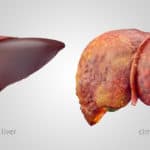Lapatinib Stabilizes Hepatocellular Carcinoma
Lapatinib Shows Promise for Advanced Hepatocellular Carcinoma: Presented at AACR
www.docguide.com
By Sophie Bainbridge
SAN DIEGO — April 21, 2008 — Lapatinib, a kinase inhibitor recently approved in the United States for treatment of HER2-positive metastatic breast cancer, may also be effective in patients with advanced hepatocellular carcinoma (HCC), investigators reported here at the American Association for Cancer Research (AACR) Annual Meeting 2008.
In a phase 2 trial that included 26 patients with advanced HCC, treatment with lapatinib stabilised disease in 8 patients after a median of 2 treatment cycles, and disease stabilisation lasted longer than 6 months in 8% of these patients, said Joseph Markowitz, MD, PhD, Researcher, Ohio State University Comprehensive Cancer Center, Columbus, Ohio.
“Rates of liver cancer are increasing in the United States. This rise correlates with the increase in hepatitis-C-related liver disease, which is a principal risk factor for HCC,” Dr. Markowitz said in a poster presentation on April 15. “There is also a link to an increased incidence of fatty liver, which is more prevalent these days because of the increasing rates of obesity and type 2 diabetes in the US population.”
Lapatinib blocks the activity of the tyrosine kinase enzyme of both epidermal growth factor receptor (EGFR) and HER2/neu, and should be effective in patients who express one or both receptors.
“Given the lack of curative or even modestly effective treatment options for patients with advanced hepatocellular cancer, new therapies are desperately needed,” he said.
Dr. Markowitz and principal investigator Tanios Bekaii-Saab, MD, Assistant Professor, Hematology and Oncology, and Assistant Professor of Pharmacology, also at Ohio State University, treated patients with oral lapatinib 1,500 mg/day. Each treatment cycle consisted of 28 consecutive days, and the median number of cycles was 2, with some patients receiving only one 1 cycle and some receiving as many as 12 cycles.
Patients had a median age of 58 years (range, 29-83 years), 65.4% were men, and Eastern Cooperative Oncology Group performance status was 0 in 12 patients and 1 in 14 patients. Twenty percent of patients had been on previous treatment before receiving lapatinib.
Patients underwent radiological assessments every 8 weeks.
Although there were no objective responses, 31% of the patients achieved disease stabilisation, and 8% had stable disease lasting longer than 6 months, Dr. Markowitz reported.
The most common toxicities were diarrhoea (69%) and nausea (54%). Three patients had grade 3/4 toxicities, including diarrhoea, rash, and acute renal failure. There was no evidence of cardiac dysfunction.
“We are analysing the survival data and correlative studies are underway to try to understand the molecular biology of this tumour and guide directed therapy for subsets of patients with hepatocellular carcinoma who may benefit from EGFR inhibition,” Dr. Markowitz said.
He added that they are also studying K-RAS mutational status because it is thought that K-RAS mutations correlate with resistance to EGFR-directed treatment. “Knowing which patients have the mutation should help us tailor treatment,” he commented.
[Presentation title: A Phase II Study of The Efficacy and Tolerability of Lapatinib in Patients With Advanced Hepatocellular Carcinomas. Abstract LB-306]







